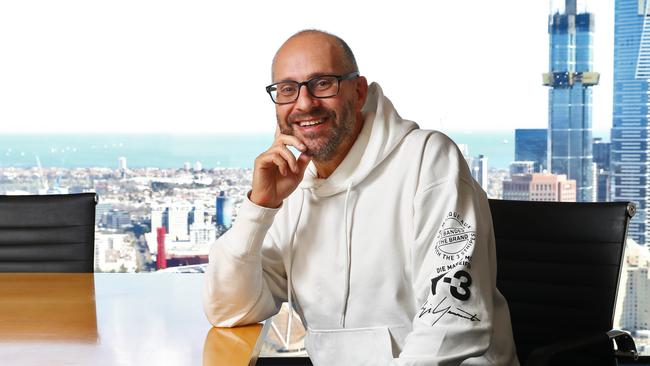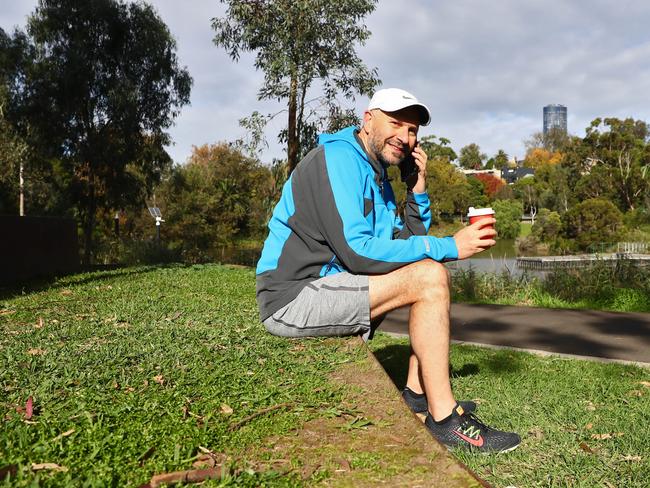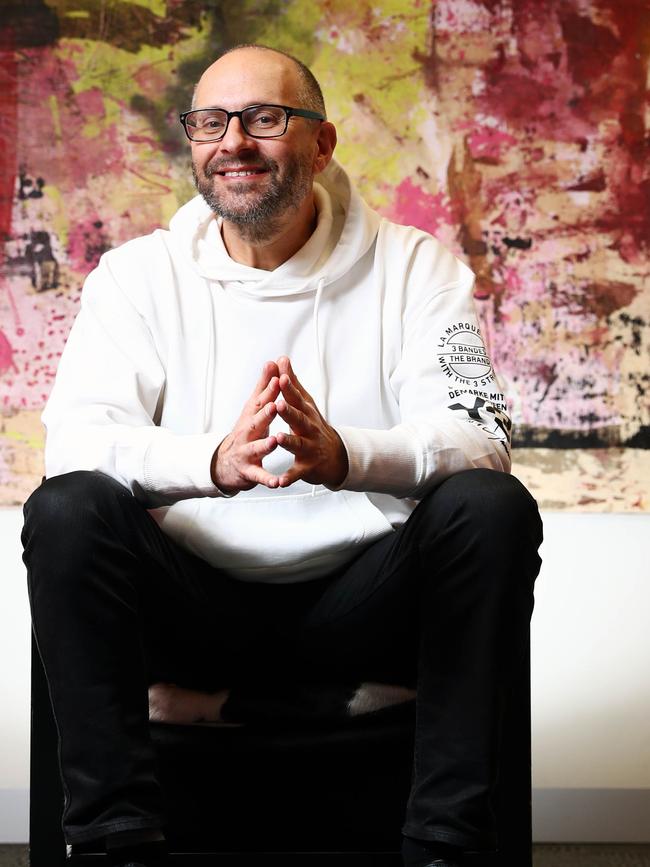The final frontier for billionaire Alex Waislitz
The billionaire investor has paddled down the Amazon and climbed Mt Kilimanjaro. He now has his eyes firmly set on space for both travel and investment.

Some of the most special and rewarding moments in Alex Waislitz’s life have been on thrill seeking adventures with his children.
In South America, they paddled down the Amazon river, in Antarctica they climbed Mount Vinson and cross-country skied to the South Pole, while in Tanzania they climbed the mighty Mount Kilimanjaro – rising above 4800 metres when you enter what’s called the “death zone” – where they all suffered bouts of vomiting, heavy-duty migraines and dehydration.
“The last day alone most of us in the party lost about three or four kilograms. I was in a bit of a trance, going in and out of reality. But we kept going and it was worth it at the end,’’ he says.
Now Waislitz is set for the biggest adventure experience of his life. His kids won’t be joining him this time, but he dreams that one day they will.
The billionaire investor is number 400 on the waiting list for a Virgin Galactic space flight, expected to take place early next year.
Waislitz put down a deposit for the trip several years ago, where those with the capacity to pay join two pilots in a six person module that super-powered by a rocket that takes them to the edge of space.
Earlier this year, the Richard Branson-backed Virgin Galactic revealed plans to open up ticket sales for the flights to the general public.

“I am a romantic adventurer by nature. Space is always one of those last frontiers that I have been fascinated by ever since I was a young boy. I grew up in the Star Trek generation. The possibility of turning that into a reality was too tempting to resist,” Waislitz says.
He has no fears about the journey, despite a pilot being killed and another injured eight years ago when Virgin Galactic’s SpaceShipTwo space tourism craft crashed in the California desert.
“No it doesn’t scare me. I wish it was tomorrow. It makes you dream and it brings you back to the questions of what is our role in the universe.
“Who knows what we will learn about the origins of the world and mankind from opening up space travel.”
But space is more than just a joy-ride for Waislitz. Always one to spy an investment opportunity, he believes the space industry is feeling the impact of rapidly accelerating technology, which is leading to much lower costs.
It is one of the reasons why his Thorney Investment Group is backing a company that calls itself Sky and Space, which builds and operates a low-earth-orbit telecommunications networks using nanosatellite technology, for the internet-of-things (IoT) and other use cases.
The business went into administration in 2020 and was recapitalised, adding Richard Branson’s Virgin Orbit and Thorney as its largest shareholders, while removing $4m of debt and $151m in commitments and contingent liabilities.
Sky and Space (SAS) late last year closed a $20m share placement, giving it the capital to manufacture and launch what it calls its IoT communication nano-satellite constellation.
The raise was structured as a convertible note priced at a 30 per cent discount to the next phase of the company’s pre-IPO process.
SAS now expects an initial public offering in the next 18 months. Before that, it plans to raise between $25m and $50m in total via pre-IPO rounds.
“The recapitalisation has allowed us to welcome blue-chip industry and first-class financial investors as shareholders. Our sincere thanks go to Virgin Orbit, Thorney Group, Merchant Fund and CPS Capital amongst many others for your terrific support,” SAS’s Perth-based CEO Meir Moalem told shareholders earlier this year.
“Leveraging the company’s past achievements and accomplishments such as space-proven technology, proprietary network management software and existing commercial agreements; the team has further accelerated its plans since relaunch.”
SAS itself is a relaunch of a company that employs mostly Israeli technology but which has completely restructured its cost base and pushed down the cost of manufacturing and launching a satellite from $US1.5m to $US350,000.
Its presentation to investors for the capital raising claimed each satellite can deliver over $98m in revenue when at capacity and put a valuation on the business of $US125m to $US175m.
“The costs of manufacturing satellites and the cost of launching them have now come down to the point where nano satellites for communication and other uses are within reach for companies which would not have been able to afford them even a decade ago. This is creating thousands of opportunities and a whole new sort of space race. We think SAS is ideally placed to help meet this demand and it has an early mover advantage in the low cost nano satellite area,” Waislitz says.
SAS currently has three nanosatellites in orbit and is being led by a new team including a number of Australians.

On its board is big-haired Australian entrepreneur Silvio Salom, who founded a company that sells air-traffic control systems and air-traffic control simulators called Adacel. Waislitz’s Thorney Group has been a shareholder in Adacel for some 25 years.
In early March, SAS appointed Israeli space tech start-up AYECKA Communication Systems, an emerging provider of satellite communication payloads and ground networks, to provide the company with user satellite terminals.
These feature multifunctional, high reliability modems with integrated antennas which are able to support high speed narrow band data rates.
SAS already has some 55 customers who plan to procure the ground terminals to facilitate satellite access for their end users.
SAS is now in the production process for an additional 16 satellites as part of what it calls its 400-strong IoT communication nano-satellite constellation. It envisages that constellation operating commercial services and generating revenue in the first quarter of 2023.
“I think SAS is a good example of global collaboration in what is an exciting and rapidly growing area. Australia is well placed to play a key role, especially since the Federal Government and some States have named the space sector as an important industry for the future,” Waislitz says.
“Other visionaries like Elon Musk and Jeff Bezos have also identified space as an exciting area to explore for everything from tourism to communications to mining and even to inhabiting other planets. It’s a journey that’s really just beginning and it will be tremendously exciting to follow.”
Over the past month Musk has also inserted himself into the war between Russia and Ukraine by bolstering the latter’s internet connection to the outside world in its time of need.
His trucks have been delivering shipments of satellite-based Starlink internet terminals to Ukraine, responding to a plea from the nation’s vice prime minister. His system beams data from space, so is less vulnerable to attack or authoritarian control by Russian President Vladimir Putin’s regime.
“Elon Musk directing more satellite capacity into Ukraine shows the growing influence and positioning of the satellite networks that are being built. That has implications for war and space wars, which is scary to think about,” Waislitz says.
“But perhaps it is not so far from reality. The real impact of GPS from space is being thrust into a new level of realism based around Musk’s assistance to Ukraine.”
Musk has also vowed that his SpaceX will rescue the International Space Station if Russia tries to drop it from orbit after threats by Putin’s space chief.
Russia is a key part of the 15-nation partnership that has kept the ISS orbiting Earth for 23 years but relations are at an all-time low because of Russia’s decision to invade Ukraine.
Waislitz has never met Richard Branson but has tremendous respect for the British entrepreneur’s vision in identifying space tourism as something that will be possible in his lifetime.
“I’m excited that Virgin Orbit has a stake in SAS and I think it’s a huge vote of confidence in the company,” he says.
“It gives credibility to the business plan they are putting forward. Virgin have also had access to a lot more funding since they took their stake. Their investment makes this a much more realistic story.”

